Program Faculty Research Mentors
Program Faculty Research Mentors
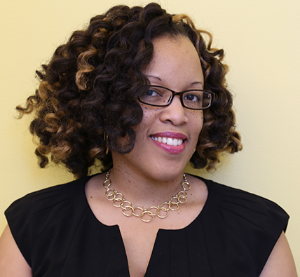
Dr. Tyesha Burks earned her PhD at the Johns Hopkins School of Medicine, with expertise in human genetics and molecular biology. Prior to that, she earned a Bachelor of Science at the University of Maryland Eastern Shore. After pursuing her PhD, Dr. Burks remained at Johns Hopkins School of Medicine to complete a postdoctoral fellowship. Dr. Burk’s research interests lie at the intersection of human health, aging, molecular biology and genetics. Sarcopenia is the age-related loss of skeletal muscle mass and function. Most humans begin to lose muscle mass around the age of 50 and progressively continues throughout their lifespan. Sarcopenia affects everyone from former elite athletes to people with sedentary lifestyles and can increase the risks of falls, disabilities, frailty, and death. The molecular mechanisms underlying sarcopenia are largely unknown, although researchers have identified some pathways associated with it. Dr. Burk’s research investigates the key signaling pathway modulation(s) that precede the phenotypic findings of sarcopenia and in identifying compounds that will affect the onset and/or progression of sarcopenia.
- Dr. Chaverri is a mycologist (expert in the study of fungi and plant diseases), trained in systematics, taxonomy, phylogenetics and phylogenomics of fungi. With a Ph.D in Plant Pathology at Pennsylvania State University, her research focuses on using systematics to predict ecological functions and biological activity of fungi found in natural phytobiomes, with application in sustainable agriculture and biological control. Dr. Chaverri has extensive research and teaching experience, with multiple peer-reviewed articles, including field guides and monographs. She was recognized as the Scientist of the Year for Costa Rica in 2016 and was elected to the National Academy of Sciences in Costa Rica in 2021. Dr. Chaverri loves working with students and has mentored over 30 undergraduate students, 6 PhD graduates, many interns and visiting scientists.
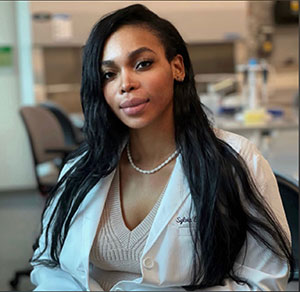
Dr. Sylvia Ejeh's research interest revolves around improving public health concerns worldwide. Dr. Ejeh's research expertise is in using metagenomics to unveil the genetic content of the total microbiota in different environments and antibiotic resistance genes, as well as evaluating potential risks of food allergy and to predict microbiome functionality.
Dr. Ejeh has conducted research on a variety of topics, including: (1) DNA Barcoding for Quality Control of Gluten Free Products, where DNA Barcoding was used to Instigate the risk of adulterated food products on Immunoglobulin E (IgE) IgE-mediated (type I hypersensitivity), non-IgE mediated (e.g. celiac disease), mixed, and cell mediated (allergic contact dermatitis) reactions in hopes to discuss potential therapeutic targets for preventing food-induced anaphylaxis. (2) The effect of Urbanization vs Non-urbanization on the microbial community in Surrounding Water Bodies, where metagenomics was used to analyze the effect of urbanization within the water bodies surrounding Bowie State University's campus on Antibiotic Resistance, comparing upstream and downstream water samples for colony growth on Broad-spectrum antibiotic treated plates and untreated plates. Assessing water for antibiotic contamination may result in water treatment processes that include removal of antibiotics, to combat the evolution of antibiotic resistant bacteria. If care is not taken, we will head for a post antibiotic era in which common infections and minor injuries, which have been treatable for decades, can once again kill.
As a Biology professor, Dr. Ejeh's goals are to foster enthusiasm and curiosity for biology, instill in students- an understanding of what it means to be a biologist, and to facilitate student learning of biological concepts. Dr. Ejeh extends the biological concepts framework to issues of health relevance into classroom lectures and incorporates course based undergraduate research projects into the labs. This leads to an engaging learning experience for students and gives students the opportunity to be active participants in the scientific community.
Dr. Ejeh is committed to keeping up to date on the best practices in biology education pedagogy, using a student-centered approach that incorporates public health concerns to thread a number of biological concepts, it encourages students to move away from seeing biology as a collection of disparate concepts, subject areas, or chapters from textbooks; which has proved to be effective in her Microbiology II course, as it improved the students' learning retention.
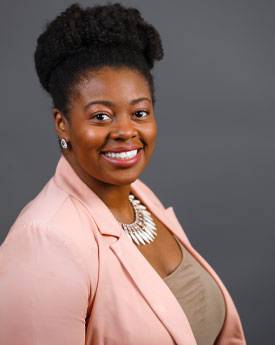
RESEARCH STREAM(S): Cell Culture
Dr. Devyn Gillette is an Assistant Professor of Biology at Bowie State University, where she leads initiatives centered on immunology, first year experiences, and racial equity in STEM. As an HBCU graduate from Winston Salem State University, she developed the curiosity that shaped her career as a lifelong learner which led her to earn a Doctorate in Biomedical Sciences at The Ohio State University. She studied innate immune responses to bacterial stimulation, followed by postdoctoral training at the University of North Carolina at Chapel Hill investigating mitochondrial biology in sepsis. Her current research program focuses on how airway epithelial cells regulate cytokine signaling during bacterial challenge and how these pathways influence membrane integrity during disease states such as Cystic Fibrosis, work supported by an NSF HBCU UP Research Initiative Grant. Dr. Gillette also designs programs that expand STEM training for underrepresented students, serving as a Co-Principal Investigator for the Robert Noyce Teacher Education grant and an NSF Racial Equity in STEM award, and previously directing the IMSD program at Duke University where she built programming to enhance diversity and student development across academic levels. Her dedication has earned recognition as one of Cell Press’s 1000 Inspiring Black Scientists in America and the Outstanding Young Faculty Award for the College of Arts and Sciences at Bowie State.
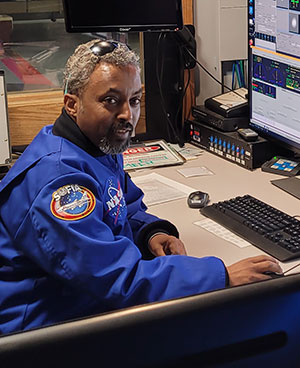
Dr. Hailu earned his Bachelor of Science in Physics, in 2000, his Master of Science in Quantum Optics in 2005 from Addis Ababa University, and his Ph.D. in Molecular Physics from Hebrew University of Jerusalem, Israel, in 2016. In his thesis work, he pioneered the use of Lie algebra to study the dynamics of molecules and atoms.
After completing his Ph.D., Dr. Hailu accepted a position as a postdoc at the Ben-Gurion University of the Negev, where he worked for 2 years. During that time, he investigated the transfer and control of coherences in a noisy environment. He further accepted a research position at Sungkyunkwan University in South Korea where he studied the possibility of using continuous variables for quantum computation in molecules.
Dr. Hailu is one of the 13 teachers across the USA selected for the 10th cycle of NASA Airborne Astronomy Ambassador (AAA) of professional development work and training with the NASA Airborne Astronomy Ambassadors (AAA) program, managed and implemented by the SETI Institute. The AAA program is part of larger science education efforts by the Science Mission Directorate at NASA Headquarters.RESEARCH STREAM(S): DNA Barcoding, Applied Biotechnology
Dr. David Igwe is a distinguished researcher whose expertise in plant pathology and molecular genetics has significantly advanced agricultural science. With a Ph.D. in Agriculture and Forestry from the University of Ibadan and a strong background in zoology and biochemistry, Dr. Igwe has dedicated his career to innovative pest-control strategies and crop disease diagnostics.
Most recently a Postdoctoral Research Associate at Cornell University, Dr. Igwe focused on combating citrus greening disease using molecular and proteomics-based approaches. Their work in qPCR analysis and neuropeptide applications has contributed to sustainable solutions in plant disease management. Bowie State University welcomes Dr. Igwe back to campus where he continues teaching genetic engineering and applied biotechnology while mentoring future scientists. His leadership extends to international research collaborations at institutions like Boyce Thompson Institute and the International Institute of Tropical Agriculture. Dr. Igwe’s contributions to agricultural biotechnology and education continue to shape the field, leaving a lasting impact on both research and practical applications.

Dr. Konda Reddy Karnati is Assistant Professor of Bioinformatics in the Department of Natural Sciences at Bowie State University. He obtained a Bachelor of Science in Biotechnology from Sri Venkateswara University, a Master of Science in Bioinformatics from Pondicherry University, and his Ph.D. in Bioinformatics from Alagappa University, all in India. He underwent postdoctoral training at the National University of Singapore, and conducted a second postdoctoral training and short-term instructional position at Albany State University in Georgia. His main research interest lies in structural bioinformatics and biomolecular simulations. His lab focuses on HIV -1 protease drug resistance and HIV -1 integrase and human protein- protein interactions through computational approaches. He has published over 20 papers in peer -reviewed journals and three book chapters in different Bioinformatics books.
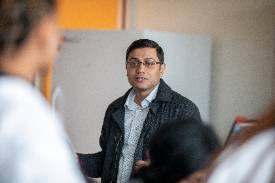
Dr. Supriyo Ray completed his undergraduate studies in Zoology, Botany and Chemistry and then completed a Master’s in Biotechnology, specializing in plant biotechnology, in India. He pursued graduate studies at the National Institute for Malaria Research, New Delhi, India, before moving to University of Central Florida, Orlando, Florida, to complete another Master’s in Microbiology & Molecular Biology and a PhD in Biomedical sciences. He used biophysical and biochemical techniques to elucidate the role of membrane lipids in modulating protein structure and their function. After graduation, he conducted his postdoctoral studies at the Salk Institute for Biological Studies at La Jolla, California, before moving to University of California San Diego. There, he worked on various theories related to membrane lipids and proteins and in the process developing advanced microscopy based techniques. Most recently, Dr. Ray was at University of Texas at El Paso, which is a ‘minority serving institution’ and is a part of NIH’s nation-wide initiative to transform education by broadening the participation of undergraduates from traditionally under-represented backgrounds in graduate school.
Dr. Ray joined the Natural Sciences department at the Bowie State University in fall of 2019. In his CURE course, co-taught with Dr. Ude, they plan to introduce advanced molecular biology concepts and help students develop proficiency in molecular biology related bioinformatics tools. His motivation for conducting CURE comes from prior experience at UTEP where the students learnt advanced concepts in Biochemistry much more effectively after exposure to CURE-like programs.
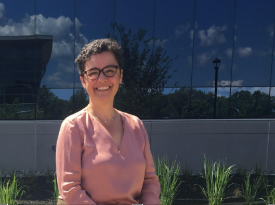
Dr. Santacruz’s interests and expertise lie in cellular physiology, specifically in the mechanism mediating transport across membranes and in energy metabolism. Dr. Santacruz completed her BSc degree in Microbiology at Universidad de los Andes, in Bogota, Colombia (South America), followed by a PhD in Physiology at UCLA School of Medicine. She pursued postdoctoral fellowships at the Cardiovascular Research Laboratory at UCLA, and Baylor College of Medicine in Houston, TX. Prior to joining the Natural Sciences Department at Bowie State University, Dr. Santacruz was on the faculty at the Surgery Department at Duke University Medical Center in Durham, NC, and in the Department of Biochemistry and Molecular Biology at the University of Texas, Medical Branch in Galveston, TX. Among other efforts, Dr. Santacruz has been instrumental in establishing the Bioinformatics Program at Bowie State University and serves as the Bioinformatics Coordinator. Dr. Santacruz is passionate about STEM and biomedical education and mentoring young scientists.
.
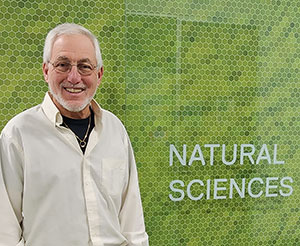
Dr. Sbrockey's education includes a B.S. in Metallurgical Engineering from the University of Cincinnati and a Ph.D. in Materials Science and Engineering from Northwestern University. He spent the majority of his career as a scientist in the electronics industry, specializing in novel electronic materials and fabrication technology for microelectronic devices. Dr. Sbrockey holds 2 patents, has authored over 30 journal publications and given numerous presentations at technical conferences. Dr. Sbrockey retired from full time work in 2018. He teaches chemistry and physics part-time at Bowie State University and Stevenson University.
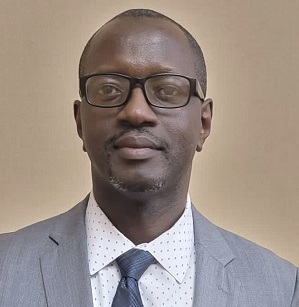
Professor John Sesay graduated with a Master of Science Degree in neuropharmacology of opiates and memory in both rodents and non-human primates from Wake Forest School of Medicine. His research was on tracking the changes in hippocampal population nonlinear dynamics in rats learning a memory-dependent task. He furthered my education at St. George's University School of Medicine and gained a comprehensive understanding of basic and clinical sciences. Since joining the faculty of Natural Sciences, his research and teaching have been dedicated to enhancing students' experiments with scientific processes, nurturing their skills, and inspiring them to excel in biomedical and biotechnology fields and pursue higher education. Teaching and laboratory research are his passions. We are so glad to have Professor Sesay as an adjunct professor of Biology at Bowie State University, teaching various biological Science courses, including anatomy and physiology, and serving as a Lead Tutor in Biology for the Natural Sciences Tutoring Program.
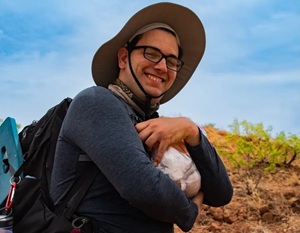
Dr. Jack Stack is a researcher, writer, teacher, and historian of Earth history. As a research scientist, he integrated traditional paleobiology and phylogenetic comparative biology to characterize the historical patterns and evolutionary processes that have driven the extant biodiversity of ray-finned fishes (>32,000 species). His goals are to contribute to Bowie State by conducting impactful, high-quality research, connecting the public to critical scientific insight through outreach, and advocating for equity and justice in STEM by mentoring motivated and diverse students.
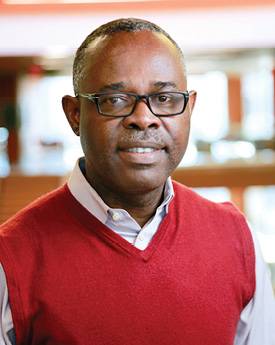
Dr. George Ude is the Wilson H. Elkins Professor and Department Chair in the Department of Natural Sciences. A long-term educator who has championed the incorporation of experiential learning and discovery-based practices in the classroom, Dr. Ude has worked to diversify the educational and professional development capacities of students in STEM disciplines. As a geneticist and molecular biologist, Dr. Ude’s research interests lie in catalyzing advances in plant breeding and plant genetics techniques. Modern day genomics holds the promise of helping scientists to answer very complex questions in basic plant science, to understand plant genomes and biomes, and to help in the conservation of precious ecosystems and our natural resources. He has spearheaded research collaborations to expand the genomic sequencing capabilities at various institutions and loves working with students. Dr. Ude lead the department effort to launch the first HBCU Course-based Undergraduate Research Experience at Bowie State, attended about 40 professors from more than 20 HBCUs around the country. Dr. Ude earned his PhD at the University of Maryland at College Park, his Masters of Science from Obafemi Awolowo University in Nigeria and a Bachelor’s of Science from University of Ife in Nigeria.
- Dr. Rakesh Upadhyay is an Assistant Professor of Biology, previously a research scientist at USDA-ARS Beltsville Agricultural Research Center (BARC) with a dual appointment with Purdue University and Bowie State University. As a lead investigator, his research is focused on genetic improvement of specialty crop tomato for quality traits such as yield, fruit size, fruit shelf life and abiotic stress tolerance for drought and heat. He uses plant biotechnology and functional genomics tools for genetic elucidation of novel phyto-biochemical pathways and their encoding gene networks which are further used as a potential target for genetic engineering and gene editing for generation of novel germplasm. He is also looking at molecular genetic evolution of specific phyto-metabolic pathways in aquatic plant Duckweed. Dr. Upadhyay's industry experience comes from working at Merck-Millipore pharmaceuticals as scientist- research and development for two years. Dr. Upadhyay is interested in filling the knowledge gap and increasing participation of students from under-represented institutions.
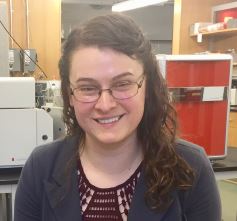 Dr. Anne Wiley is an ecologist and environmental scientist whose research focuses on vertebrate diet and movement. Diet is a fundamental aspect of vertebrate biology that can dictate animal growth, survival, movement, interaction with humans and other species, and response to environmental change. Most of Dr. Wiley’s research relies on stable isotopes – alternative forms of elements that animals inherit from their food and water. The ratio of stable isotopes in animal tissues can be used to make inferences about animals’ diets and food webs. Furthermore, because the ratio of stable isotopes can remain unchanged in bones and other tissues long after death, they can be used to reconstruct the biology of animals that lived thousands of years ago, or modern animals that cannot be observed first-hand. Using stable isotopes and complimentary tools such as GPS tracking, Dr. Wiley has conducted research on a variety of topics, including: (1) interpreting decadal to millennial-scale diet trends in seabirds to understand human impact to open ocean food webs, (2) the dietary basis of colorful skin ornaments in birds, (3) the dietary needs of animals threatened with extinction, and (4) the ecology of human diet and movement in neighborhoods labeled as food deserts (those with limited access to healthy, affordable foods).
Dr. Anne Wiley is an ecologist and environmental scientist whose research focuses on vertebrate diet and movement. Diet is a fundamental aspect of vertebrate biology that can dictate animal growth, survival, movement, interaction with humans and other species, and response to environmental change. Most of Dr. Wiley’s research relies on stable isotopes – alternative forms of elements that animals inherit from their food and water. The ratio of stable isotopes in animal tissues can be used to make inferences about animals’ diets and food webs. Furthermore, because the ratio of stable isotopes can remain unchanged in bones and other tissues long after death, they can be used to reconstruct the biology of animals that lived thousands of years ago, or modern animals that cannot be observed first-hand. Using stable isotopes and complimentary tools such as GPS tracking, Dr. Wiley has conducted research on a variety of topics, including: (1) interpreting decadal to millennial-scale diet trends in seabirds to understand human impact to open ocean food webs, (2) the dietary basis of colorful skin ornaments in birds, (3) the dietary needs of animals threatened with extinction, and (4) the ecology of human diet and movement in neighborhoods labeled as food deserts (those with limited access to healthy, affordable foods).Dr. Wiley has enjoyed teaching undergraduate students for over 10 years, both inside and outside of the classroom. One of her primary teaching aims is to motivate students by feeding their sense of curiosity about the natural world. She especially enjoys bringing students into the field to study nature first-hand, and to that end, she has led classes in the Bahamas for several years and has mentored many students as they developed their own field-based research projects. Outside of the classroom, she has mentored nearly 20 students in lab and stable isotope-based research projects focused on an array of animals, from Mexican seabirds to Ohio cicadas and Florida manatees.
Dr. Wiley’s career began in her native state of Michigan where she earned a B.S. in biology at the University of Michigan, then a Ph.D. in zoology at Michigan State University. Her initial inspiration to study biology came from growing up on her mother’s rabbit farm, collecting insects in streams with her father, and preserving mammal specimens at the University of Michigan’s Museum of Zoology as an undergraduate. After earning her doctorate, Dr. Wiley worked as a postdoctoral researcher at the National Museum of Natural History, Smithsonian Institution, where she continued her Ph.D. studies of Hawaiian seabirds. She then established and led a stable isotope laboratory as an Assistant Professor at the University of Akron. Dr. Wiley’s research has been funded by National Geographic and published in journals such as Proceedings of the National Academy of Sciences and Proceedings of the Royal Society B.
Past Research Mentors
Jason Abraham completed his Master's of Science Degree in Biochemistry and Molecular Biology, as well as a Bachelor’s of Science Degree in Biochemistry from India. Previously, he has worked on Bioinformatics-based drug discovery projects in infectious diseases such as S. aureus and E. coli and in neurological diseases such as Alzheimer’s. He also has experience in mushroom horticulture and green nanoparticle synthesis. Currently at Bowie, he works with Dr. Ray and uses molecular, cellular, and bioinformatics-based tools for drug discovery. Professor Abraham comes to Bowie State University with great research expertise. He has worked as an adjunct professor for the Applied Biotechnology course since Spring 2023 and conducted research on the enhancement of production of clean energy with students under the supervision of Dr. Ray. Professor Abraham also serves as Research Staff within the Department of Natural Sciences.
Dr. Hyeokmin Choe received his MSc in Solid State Physics from Kyung Hee University (South Korea) and obtained PhD in Crystallography and Solid State Physics from the University of Siegen (Germany). In 2019, he worked as a postdoctoral fellow in the Tel Aviv University (Israel) and in 2019-2022 was a postdoctoral fellow in the NIST, Materials Measurement Laboratory / Euclid Techlabs LLC (USA). His research interests and expertise span fundamental and x-ray crystallography, physical properties of crystals, piezo-electrics, and ferroelectrics, high-resolution x-ray diffraction and time-resolved x-ray diffraction studies of crystalline materials under external perturbation, application of synchrotron radiation. The research works are frequently performed at central synchrotron radiation facilities as PETRA III, BESSY II, ESRF and NSLS-II. Dr. Choe is excited to share the impact of crystallography and physics research to students through CUREs. When he is not teaching CUREs, you can find Dr. Choe improving the function and operations of the DNS X-Ray Crystallography machine.
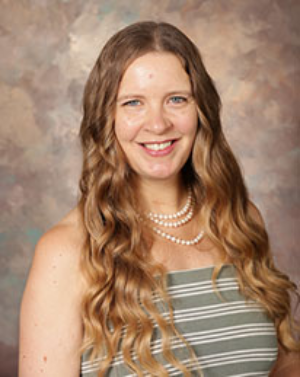
Dr. Kari Debbink earned her Ph.D. from University of North Carolina-Chapel Hill, where she studied norovirus evolution. Prior to that, she earned a B.A. in biology from New College of Florida and a M.Ed from Endicott College. She also spent 9 years as a middle school science teacher. After pursuing her Ph.D., Dr. Debbink completed postdoc fellowships at University of Michigan, where she studied influenza evolution, and at the NIH studying flaviviruses including Zika virus. Since coming to Bowie State University, Dr. Debbink has developed research collaborations with investigators at UTMB studying coronaviruses, including the novel SARS-CoV-2 virus, and at University of Maryland-College Park studying a novel approach to combating citrus greening disease. While Dr. Debbink enjoys doing research, her biggest passion is developing engaging and effective teaching approaches in the undergraduate classroom. To that end, she has been instrumental in establishing the Science Education Program here at Bowie State, and serves as the Science Education Coordinator. She is part of a global CURE project called "PARE," which catalogues the prevalence of antibiotic resistance in the environment.
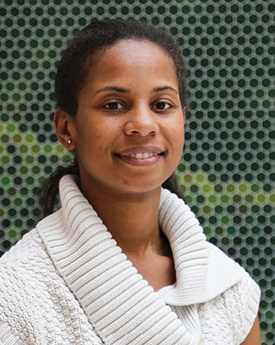
Dr. Jacqueline Smith is an alumna of UMBC's Meyerhoff Scholars Program. She received her PhD in organic synthesis under Dr. Herman Sintim at the University of Maryland College Park. She conducted a postdoctoral fellowship at Georgetown University in the Drug Discovery Center under Dr. Milton Brown. During her training, Dr. Smith published 11 peer-reviewed articles and produced two patents. She joined the faculty of the Natural Sciences Department at Bowie State University in 2016. Since 2016, Dr. Smith has developed a research program which trains undergraduates in organic synthesis and chemical biology, with several students attending graduate and professional schools. Her research has been funded through the NSF Catalyst Award as well as several internal funding programs. In addition to her research, Dr. Smith has been instrumental in establishing the Chemistry degree program at Bowie State University and serves as the Chemistry Coordinator. She is a strong advocate for K-12 outreach and mentors high school students in her lab and uses social-cognitive and metacognitive theories to engage and encourage students.
Dr. Ajiri Eroraha graduated from Notre Dame of Maryland University in Baltimore, Maryland, with a BA in Biology and dual minors in Chemistry and Mathematics. She continued her education at Ross University School of Medicine in Barbados, West Indies. She has conducted research on health disparities and surgical outcomes. While at Bowie State University, she has been a Lead Tutor of Biology and has spearheaded the Taco Bout It series, geared towards improving student success and retention through active learning and professional development. This semester, she took the lead in teaching all sections of the Natural Sciences Department’s Freshman Seminar and continued the CURE Freshman Research Initiative by encouraging student-initiated research projects. Of all these things, she is most passionate about seeing people’s lives transformed by the power of Jesus Christ.
- Dr. Niangoran Koissi comes to Bowie State University with extensive expertise in BioOrganic Chemistry, specifically on the chemistry of key intermediates that mediate the biological effects of mutagenic and carcinogenic nitrosamines, Dr. Koissi received his PhD from the University of Turku, in Turku, Finland, and conducted postdoctoral studies at the University of Maryland Baltimore County. Dr. Koissi’s major contribution has been in the development of new methods for various nucleoside crosslink standards synthesis, their characterizations and derivatizations. Dr. Koissi has also done extensive work in curriculum development and several projects in STEM pedagogy and STEM education, entrepreneurship and other synergistic co-curricular activities. Welcome to the CURE family, Dr. Koissi!
During Dr. Smith's graduate studies (M.Sc. BiologicaI Sciences) at Njata University College, University of Sierra Leone in Professor Abu Sesay's Molecular Biology laboratory, Dr. Smith investigated "Detecting Selection in Noncoding Nucleotide Variation: Method and Application." My current Research Interest is in Molecular Biology, lmmunology and Human Genetics. Dr. Smith has over 25 five years' experience teaching Biology to Undergraduate and graduate students. Dr. Smith taught the following Biology Courses: Anatomy and Physiology, Genetics, Cell Biology, Concepts of Biology, GeneraI Biology, Introduction to Biology, Molecular Biology, lmmunology and Microbiology with their Laboratory components. Ur. Smith love research, teaching, and reading. Dr. Smith taught the above courses in the following Universities/Colleges: Campbell University, Buies Creek North Carolina, Johnston Community College, Smithfield, North Carolina, Baltimore City Community College, Baltimore Maryland, Stevenson University and now Bowie State University in Maryland, USA. 0utside of academia, Dr. Smith loves riding bikes, relaxing on the beach drinking coconut water, fishing, preaching of the gospel, sports, family life, music etc. Welcome to the CURE family, Dr. Claude Smith!
Dr. Cecilia Chika Unegbu is an analytical/environmental chemist and a long-term educator. She had taught chemistry at the undergraduate level for over 20 years. With great interest in research, she was the Director of Research for Innovation and Development at her home institution in Nigeria and had attracted several research grants. Dr. Unegbu has conducted research on a variety of areas in chemistry and biomedical sciences and has published in several peer reviewed journals. Dr. Unegbu started her research fellowship at Morgan State University, where she worked with a team of researchers to Synthesize and evaluate the anti-cancer potentials of some metal-organic frameworks. Dr. Unegbu is currently at Bowie State University, where she is doubling as a research fellow and adjunct professor. She amazingly embedded Research into her CHEM 107- general chemistry, where she combined traditional labs and experiential research. Her CURE projects on Drug Analysis have contributed to research on general chemistry.
Past CURE Research Faculty
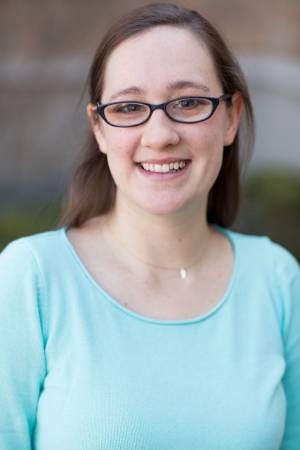
Dr. Mary Glover is an Instructor in the Department of Natural Sciences at Bowie State University. Dr. Glover attended the University of Tennessee, Knoxville, majoring in Biology with a concentration in Ecology and Evolutionary Biology. She then went on to the University of Notre Dame where she earned her PhD working with Dr. Jeffrey Feder. For her dissertation, Dr. Glover studied the ecological and evolutionary mechanisms that promote speciation in flies that infest walnuts in the United States and Mexico. At the University of Notre Dame, Dr. Glover was also a teaching apprentice in a general biology laboratory course and on the Course Design committee to develop a new introductory biology course sequence for undergraduates.
